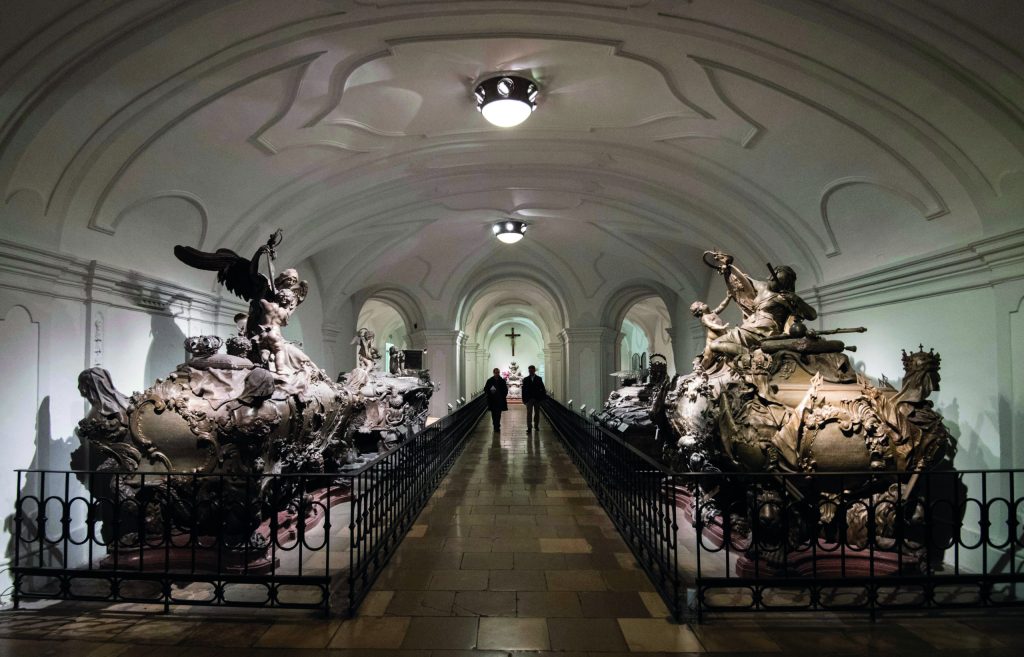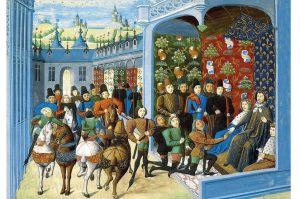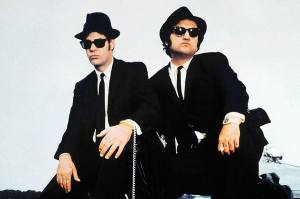‘The Radetzky March’ was composed by Johann Strauss the Elder as a tribute to Field Marshal Joseph Radetzky von Radetz. An aristocrat of Czech origin, he was one of the fiercely conservative soldiers who gave the Habsburg Empire its bad name. First performed in 1848, the year of revolt in Europe, the ‘March’ was an immediate success. Austrian bands men were playing it at the battle of Königgraetz in 1866, fought against the Prussian Kaiser. For the first time, the Prussians had machine guns, and their rapid fire bloodied the white uniforms of the Austrians.
Prussian victory condemned Austria to be the lesser of the two German-speaking nations, and on the losing side in the two world wars. Talleyrand, most mischievous of wits, had already come out with le mot juste: ‘Austria has the tiresome habit of losing all its wars.’ Joseph Roth presumably had those blood-stained uniforms in mind when, 14 years after the collapse of the Habsburg Empire in 1918, he used ‘The Radetzky March’, with all its ironies, as the title of his great novel.
Martyn Rady’s The Habsburgs is fairer and more interesting than a good many standard works, for instance those of C.A. Macartney or A.J.P. Taylor. Catholics and Holy Roman Emperors, the Habsburgs in his view stood for continuity and stability whether they were ruling from the Hofburg in Vienna or the Escorial in Madrid. They were not all philistines either.
Revolutionary nationalism was a force capable of mobilizing the masses, and how to confront it was the test facing, and in the end undoing, Franz Josef, emperor in the long-drawn years of his reign from 1849 to 1916. A man of honor, old-fashioned, he comes out of Rady’s book as someone whose best isn’t quite good enough, someone for whom pity and sympathy are in order. The great Czech historian Frantisek Palacky is remembered for saying, ‘If the Austrian Empire didn’t exist it would be necessary to invent it,’ by which he meant that intellectuals like him had to find some way of binding together the constituent nations of the empire — although its destruction was their life’s work. Vienna had no Bolsheviks or Young Turks to bring on a violent ending. Rady tells how in 1918 the socialist Karl Renner called on Franz Josef’s nephew Karl, emperor for a few final months, and packed him off into exile with the words,‘Herr Habsburg, the taxi is waiting.’
The Hofburg has a few Habsburg possessions on display, including the truckle bed on which Franz Josef liked to sleep, military campaign-style. Underneath the Capuchin church is a crypt where 149 members of the Habsburg family lie, 12 of them emperors. Occupying a vast space on the outskirts of Vienna, the Arsenal has lines of symmetrical buildings imitating 19th-century Italianate architecture. The army museum in this unreal setting conveys a genuine Habsburg pathos. Covering one whole wall is a marble Ehrentafel, or list of honor, recording the names and titles of the foreign adventurers who entered the service of the Habsburgs and found death or glory, as often as not in obscure battles in unknown places.
The Archduke Franz Ferdinand and his wife were being driven through the streets of Sarajevo on the doom-laden day in June 1914 when a Serb terrorist shot and killed them both. The center piece in one of the rooms is the car itself, hugely heavy, and borrowed from a friendly Count Harrach because the archduke did not have the means to have his own. A very large commemorative picture shows a great many officers in uniform seated at a banquet in that same summer of 1914. An adjoining cut out names each one of these aristocrats, unconscious that this was their one last fling. Liberals in the 19th century could never quite decide who was the worst oppressor of his subjects between the Habsburg emperor, the Russian czar or the Ottoman sultan, each of whom was accused of running a prison-house of nations. As far as Austria is concerned, Henry Wickham Steed, foreign correspondent and editor of the London Times, did more than anyone to create an unfavorable climate of opinion. The following quotation is taken at random from his writing.
‘The name “Austria” meant every device that could kill the soul of a people, corrupt it with a modicum of well-being, deprive it of freedom of conscience and of thought, undermine its sturdiness, sap its steadfastness and turn it from the pursuit of their ideal… the Hapsburgs with their Army, their Church, their Police and their Bureaucracy were the living embodiment of this system.’
Like the Habsburgs, the Ottoman sultans were at the head of a political structure that allowed minorities to keep their identity and their religious practices. The reputation of T.E. Lawrence of Arabia rests on his determination to make Arabs a separate and superior minority at Turkish expense. All such cause-mongers have been imposing their projects on people in countries where they themselves did not live and never would. It took the best part of a century before it was recognized that the world order was trying to restructure the uniquely pluralistic Habsburg and Ottoman empires that the Great Powers recklessly swept away in the aftermath of the First War.
I first heard of Joseph Roth from George Weidenfeld, the publisher. When Hitler incorporated Austria into the Reich, George was 18, and it was up to him, an only child born and brought up in Vienna, to rescue his parents. At one point he found himself in Paris without enough money to buy a ticket to London where the bureaucrats were ready to grant refugee status to all three. The Austrian political parties had formed a committee to help refugees, and Joseph Roth was the Habsburg representative on it. When George went before the committee to plead his case, it was Roth who said, ‘Mr Weidenfeld, what’s that on your wrist?’
‘My watch.’
‘Sell it, Mr Weidenfeld, sell it.’
Born in 1894 into a Jewish family, Joseph Roth grew up in a town in Austrian Galicia close to the Russian border. In the 1920s he lived in Berlin, and traveled in central Europe and the Soviet Union, writing novels and feuilletons. He knew from experience what to expect from the Hitler regime replacing the Habsburgs.
‘I paint a portrait of the age,’ he explained to his publisher. Published in 1932, The Radetzky March was a novel that went against the grain, a requiem for a past of custom and order. Joseph Trotta, a Slovene peasant now a young lieutenant, saves the life of the Kaiser at the battle of Solferino. Trotta, his son and then his grandson, are soldiers leading a regimental life and proud to proclaim themselves Austrian. The usual troubles to do with money and love affairs bring the risk of disgrace. The Kaiser can’t quite remember who Trotta is or why he owes these men anything, but he nevertheless does the right thing.
‘The empire is doomed,’ says a cynical Polish count evidently speaking for Roth, ‘The instant the Kaiser shuts his eyes, we’ll crumble into a hundred pieces. The Balkans will be more powerful than we. All the nations will set up their own filthy little states, and even the Jews are going to proclaim a king in Palestine. Vienna already stinks of the sweat of the Democrats.’ Or again, ‘This era no longer wants us! This era wants to create independent nation-states. People no longer believe in God. The new religion is nationalism.’
Dodgy characters in the novel typically evoke images of death, for example: ‘They began to circle around the old empire like those black cowardly birds that ogle a dying man from infinitely far away. Dark and impatient, beating their wings, they wait for his end.’ A lesser writer might have been nostalgic evoking the past in this way, but Roth is making use of this particular story for what it has to say about authority and obedience.‘
I hate good books by godless fellows,’ and perhaps Roth was tilting at himself when he goes on, ‘and I love bad books by reactionaries.’ What I Saw is a collection of the feuilletons Roth wrote in Berlin from 1920 to 1933. In May that year, Goebbels organized a ceremonial burning of books the Nazis took against, The Radetzky March among them. Roth moved to Paris, where his health broke down as he became an alcoholic and had to deal with his wife’s schizophrenia and earn a living as well.
Michael Hofmann has edited Joseph Roth: His Life in Letters and it has to serve for insight into this extraordinary man until there is a proper biography; Keiron Pim is now writing the first English-language one. Roth’s main correspondent was Stefan Zweig, at the time a better-known author than he. Zweig’s autobiography, The World of Yesterday, is a masterpiece of nostalgia for the vanished past.
‘The barbarians have taken over. Do not deceive yourself. Hell reigns,’ Roth wrote to Zweig. Or in another agonized letter, ‘National Socialism will strike at the core of my existence.’ Roth, the last freakish defender of the Habsburgs, was rebuking Zweig, literature’s playboy, for hesitating to take a public position against Nazism. ‘I fear for your immortal soul…I am afraid you don’t quite see events straight.’ Yet another letter is an outright accusation, ‘I am no agitator. But if you have something on your conscience write it down. It will do you good.’
Otto von Habsburg, the would-be claimant to the Austrian emperor’s throne, sent his wishes that Roth would recover his health. His adjutant, Count Degenfeld, received the following response dated November 1938: ‘I beg you, Your Grace, to give His Majesty my sincerest thanks, and assure him that I will of course obey any order he cares to give me.’
Six months later Roth died from alcohol poisoning, just in time to be spared the deportation from Paris and murder in one of the extermination camps that would otherwise have been his fate.
This article was originally published in The Spectator’s April 2021 US edition.


















